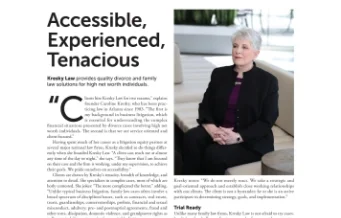Dissipation of Assets
The equitable division of marital property is a key issue in any divorce, but it becomes especially important (and especially complex) the more an individual or couple is considered to be high net worth or have a marital estate involving complicated financial structures. In Buckhead and throughout Atlanta, Kresky Law is known for representing and litigating client interests in divorce cases involving business ownership and high net worth. One critical issue that often arises in these cases is whether one party is intentionally wasting or dissipating money or assets out of spite, self-interest, or to gain an advantage in an upcoming divorce. Contact Kresky Law for a thorough analysis and practical advice if you suspect your spouse of wasting assets or find yourself accused of doing the same in an Atlanta-area divorce.
What Is Dissipation of Assets?
Dissipation of assets generally refers to one spouse intentionally wasting money or marital assets prior to filing for divorce or if a filing from the other spouse is anticipated. Marital property is subject to equitable division between the parties in a divorce, so intentionally dissipating the marital estate before that division can happen is patently unfair as it impacts and alters the upcoming division. Some of the more common ways assets a party dissipates assets include:
- Incurring a large amount of debt before filing for divorce. Since debts are subject to equitable division just like assets are, a spouse might acquire a large amount of debt for personal purposes knowing they will only be liable to pay back half the debt once it gets divided in the divorce.
- Making unnecessary large purchases that benefit only the purchasing spouse
- Gifting money or marital property to the spouse’s family and friends
Dissipation of assets can also occur when one spouse spends marital funds or uses marital property for a non-marital purpose after the marriage has broken down. A classic example involves buying gifts for a paramour or taking them on an expensive trip, or even helping to support them financially. These actions could take place in an extramarital affair during the marriage or if the party enters a new romantic relationship after the marriage has broken down but before a divorce is finalized.
Other non-marital purposes one spouse might waste money on could include gambling or drug use. Every case is fact-specific and requires a thorough knowledge and understanding of Georgia law on the dissipation of assets. The family law attorney at Kresky Law is skilled in high-net-worth divorce cases and possesses a thorough understanding of property characterization and valuation under Georgia law, including whether separate property has been commingled with marital property or used for marital or non-marital purposes. Our team is skilled in tracing assets through investments, retirement accounts, bank records, and tax documents and enlists the aid of forensic accountants and other experts as needed.
Claiming Dissipation of Assets in a Georgia Divorce
Key issues on the subject of asset dissipation can include:
- The date of separation or period when the marriage began undergoing an irretrievable breakdown
- When the money was spent in relation to the status of the marriage
- How much money was spent, what property was dissipated and what its value was
- Whether expenditures were made with the other spouse’s knowledge or agreement
- Whether the dissipated assets were properly characterized as marital or separate
- Whether the expenditures were concealed from the other spouse
Contact Kresky Law Today
A party found to be dissipating assets can be ordered by the court to reimburse the marital estate before the equitable division of the marital property in divorce, or the judge could use the fact of dissipation in determining what type of property division will be equitable. If you are accusing the other spouse of dissipation of assets, or if you’ve been accused of doing the same, a skilled and experienced divorce lawyer can help protect your rights and see that you are treated fairly. In Atlanta, contact Kresky Law at 404-869-5290 to discuss your situation and your concerns.


